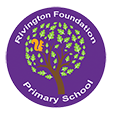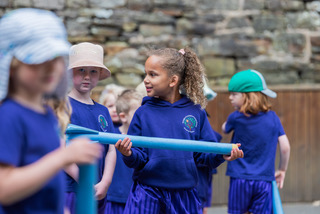
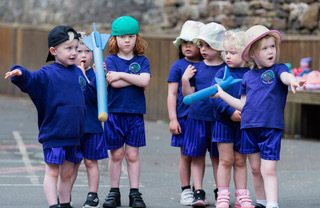
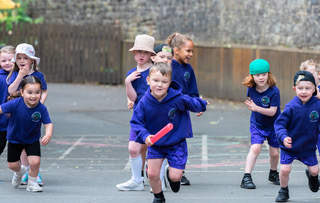
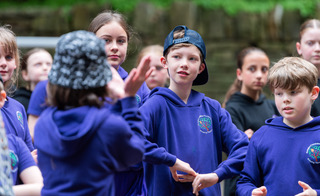
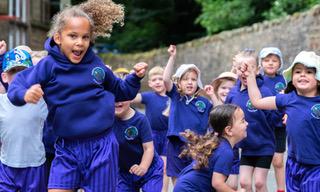
Sports
We are delighted to announce that Rivington Foundation Primary School, has achieved the School Games Gold Mark Award for the 2023/24 academic year. This is the third consecutive year that we have achieved the Gold Standard. We have also been nominated for the School Sport Spirit of the Games Award by Chorley Sports Partnership. A special thanks to: Mrs. Cliffe as PE co-ordinator (for all her hard-work and completing the bid) and to all
the staff who have attended competitions and supported our children in PE sessions and out-of-school clubs! We look forward to applying once again in 2024/25!
About the PE and Sport Premium
Physical activity has numerous benefits for children and young people’s physical health, as well as their mental well-being (increasing self-esteem and emotional well-being and lowering anxiety and depression), and children who are physically active are happier, more resilient and more trusting of their peers. Ensuring that pupils have access to sufficient daily activity can also have wider benefits for pupils and schools, improving behaviour as well as enhancing academic achievement.
The school sport and activity action plan sets out the government’s commitment to ensuring that children and young people have access to at least 60 minutes of sport and physical activity per day. It recommends 30 minutes of this is delivered during the school day (in line with the Chief Medical Officers guidelines which recommend an average of at least 60 minutes per day across the week).
The PE and sport premium can help primary schools to achieve this commitment, providing primary schools with £320 million of government funding to make additional and sustainable improvements to the quality of the PE, physical activity and sport offered through their core budgets. It is allocated directly to schools, so they have the flexibility to use it in the way that works best for their pupils.
How we use the PE and sport premium
School must use the funding to make additional and sustainable improvements to the quality of the PE, physical activity and sport we provide. This includes any carried forward funding.
This means that we must use the PE and sport premium to:
- develop or add to the PE, physical activity and sport that your school provides
- build capacity and capability within the school to ensure that improvements made now are sustainable and will benefit pupils joining the school in future years
We use the PE and sport premium to secure improvements in the following 5 key indicators.
Engagement of all pupils in regular physical activity, for example by:
- providing targeted activities or support to involve and encourage the least active children;
- encouraging active play during break times and lunchtimes;
- establishing, extending or funding attendance of school sports clubs and activities and holiday clubs, or broadening the variety offered;
- adopting an active mile initiative;
- raising attainment in primary school swimming to meet requirements of the national curriculum before the end of key stage 2 – every child should leave primary school able to swim;
The profile of PE and sport is raised across the school as a tool for whole-school improvement, for example by:
- actively encourage pupils to take on leadership or volunteer roles that support the delivery of sport and physical activity within the school (such as ‘sports leader’ or peer-mentoring schemes);
- embedding physical activity into the school day through encouraging active travel to and from school, active break times and holding active lessons and teaching;
Increased confidence, knowledge and skills of all staff in teaching PE and sport, for example by:
- providing staff with professional development, mentoring, appropriate training and resources to help them teach PE and sport more effectively to all pupils, and embed physical activity across your school;
- hiring qualified sports coaches and PE specialists to work alongside teachers to enhance or extend current opportunities offered to pupils – teachers should learn from coaches the necessary skills to be able to teach these new sports and physical activities effectively;
Broader experience of a range of sports and physical activities offered to all pupils, for example by:
- introducing a new range of sports and physical activities to encourage more pupils to take up sport and physical activities;
- partnering with other schools to run sports and physical activities and clubs;
- providing more and broadening the variety of extra-curricular physical activities after school in the 3 to 6pm window, delivered by the school or other local sports organisations;
Increased participation in competitive sport, for example by:
- increasing and actively encouraging pupils’ participation in the School Games;
- organising more sport competitions or tournaments within the school;
- coordinating and entering more sport competitions or tournaments across the local area, including those run by sporting organisations;
Chorley Schools Sports Partnership support staff in the delivery of our PE curriculum. They deliver a tailor made package of services to fit school requirements covering Physical Education and School Sport, Health & Wellbeing and Culture activities. CSSP also support school in the delivery of our whole-school cycling curriculum.
You can also contact the Association for PE, and Youth Sport Trust for support with spending your PE and sport premium.
Active mile
If schools choose to take part in an active mile, they should use existing playgrounds, fields, halls and sports facilities to incorporate an active mile into the school day and develop a lifelong habit of daily physical activity.
Raising attainment in primary school swimming
Swimming and water safety are a national curriculum requirement. It is required that by the end of key stage 2, pupils should be taught to:
- swim competently, confidently and proficiently over a distance of at least 25 metres
- use a range of strokes effectively, for example, front crawl, backstroke and breaststroke
- perform a safe self-rescue in different water-based situations
You can use the PE and sport premium to fund the professional development and training that is available to schools to train staff to support high quality swimming and water safety lessons for their pupils.
You can also use the PE and sport premium to provide additional top-up swimming lessons to pupils who have not been able to meet the national curriculum requirements for swimming and water safety – after the delivery of core swimming and water safety lessons.
You are required to publish information on the percentage of pupils in year 6 who met each of the 3 national curriculum requirements. Further details are in the online reporting section of this guidance.
Further information on training and resources, including advice on the use of the PE and sport premium, is available from Swim England.
What your funding should not be used for
You should not use your funding to:
- employ coaches or specialist teachers to cover planning preparation and assessment (PPA) arrangements – this should be funded from your core staffing budgets
- teach the minimum requirements of the national curriculum – apart from top-up swimming lessons after pupils’ completion of core lessons (or, in the case of academies and free schools, to teach your existing PE curriculum)
- fund capital expenditure – DfE does not set the capitalisation policy for schools, if you are in any doubt as to whether your proposed spending is deemed as capital expenditure, you should first speak with your school business manager or school accountant and their auditors
Accountability
School compliance
We are accountable for how you use the PE and sport premium funding allocated to us. We must spend the grant for the purpose it was provided – to make additional and sustainable improvements to the PE, sport and physical activity offered. Schools and local authorities must follow the terms and conditions in the conditions of grant.
Online reporting
We must publish details of how you spend your PE and sport premium funding by the end of the summer term or by 31 July 2022 at the latest.
Online reporting must clearly show:
- the amount of PE and sport premium received
- a full breakdown of how it has been spent
- the impact the school has seen on pupils’ PE, physical activity, and sport participation and attainment
- how the improvements will be sustainable in the future
We are also required to publish the percentage of pupils within your year 6 cohort in the 2021 to 2022 academic year who met the national curriculum requirement to:
- swim competently, confidently and proficiently over a distance of at least 25 metres
- use a range of strokes effectively, for example, front crawl, backstroke and breaststroke
- perform safe self-rescue in different water-based situations
Attainment data for year 6 pupils should be provided from their most recent swimming lessons. This may be data from years 3, 4, 5 or 6, depending on the swimming programme at your school. It is essential to retain attainment data from swimming lessons in years 3 to 5 to be able to report this accurately in year 6.
Review of online reports
School online reporting will be monitored by DfE. They will sample a number of schools in each local authority to review what they have published on their use of the funding and their swimming attainment.
School is expected to spend the grant for the purpose that it was provided only, in accordance with the conditions of grant, to make additional and sustainable improvements to the PE, sport and physical activity provided.
As part of the support package from Chorley Sports Partnership, we have purchased the PE Passport App. This provides us with comprehensive lesson plans, assessments and tracking for all phases of primary. Staff are able to follow clear plans that support CPD.
We have used part of the PE grant to fund Healthy Heads which offers a fully comprehensive PSHE/PE programme to promote and support positive mental health in children. The lessons consist of a combination of classroom learning 30 minutes coupled with 30 minutes of physical activity to reinforce and consolidate PSHE objectives. The innovative approach to teaching and learning covers three different areas of focus: Character development, British Values and Personal Development.
So far this academic year:
- KS1/Reception have completed a lunch club every week to embed and develop fundamental movement skills.
- KS2 have had optional after-school clubs in football, dodgeball, dance and boccia.
- UKS2 have completed Bike ability with 27 out of 31 children achieving level 2.
- UKS2 competed in a small school’s football competition, finishing 5th.
- LKS2 competed in a dodgeball festival alongside the sports captain’s.
- UKS2 children have completed the PAL’s programme which helps develop the use of games on the playground, ensuring that all children reach the 60mins of movement per day.
Still to come:
- LKS2 plus any UKS2 children who are unconfident swimmers will take part in an intensive swimming course.
- Reception will complete balance bike sessions, starting their Bike-ability curriculum.
- Year 2 and 6 will have external PE assessments ensuring that all children are on-track for their physical development.
- KS2 children will have the option of attending various afterschool clubs.
- Reception/KS1 will continue to have a lunch club to develop FMS.
- A number of inter-schools’ competitions.
Downloadable Documents
We are also required to publish the percentage of pupils within your year 6 cohort who met the national curriculum requirement to:
- swim competently, confidently, and proficiently over a distance of at least 25 metres;
- use a range of strokes effectively;
- perform safe self-rescue in different water-based situations.
This information can be found in the document below:
Rivington Sports Premium Impact 2022-23
Useful Links
Further guidance:
- Association for PE – advice on the PE premium
- Youth Sport Trust – primary PE and sport premium
- Sport England’s website which contains advice on using the PE and sport premium effectively see the
- Swim England’s website for advice and resources on primary school swimming and water safety
- UK coaching’s primary schools toolkit for advice on employing sports coaches for your school
- DfE teacher blog for best practice examples of how schools are using their premium effectively
- what works in schools and colleges to increase levels of physical activity among children and young people from Public Health England
